The apps that we cover are usually ones for professionals, hobbyists, students, etc – mostly adults. But children use computers too, in fact, now more than ever, and the awesome Linux platform has a variety of software to keep them engaged and learning things.
Read Also: Best Programming Tools for Tutoring Kids
Today, we bring you the 15 best Linux educational software for kids.
1. Kanagram
Kanagram is a KDE letter-order game that aims to build children’s vocabulary by teaching them words. It features a responsive GUI, several word lists, a word list editor, and a system that enables hints and cheats (which reveals the complete word).
The aim of the game is to put letters in the correct order to form words and there is neither a time limit nor a limit on the number of tries.
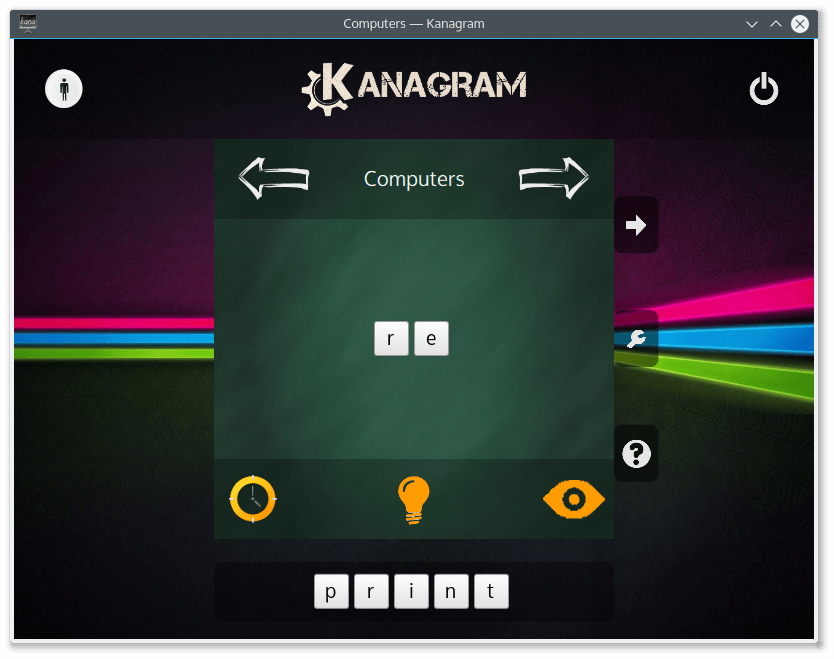
Install Kanagram on Ubuntu based distributions using following command.
$ sudo apt-get install kanagram
2. GCompris
GCompris is an awesome suite of applications with 100+ engaging activities such as drawing, algebra, quizzes, reading practice, memory games, tic-tac-toe, chess, etc.
GCompris is available on the most popular platforms, is targetted and children between the ages of 2 and 10, and it is available in 50+ languages.
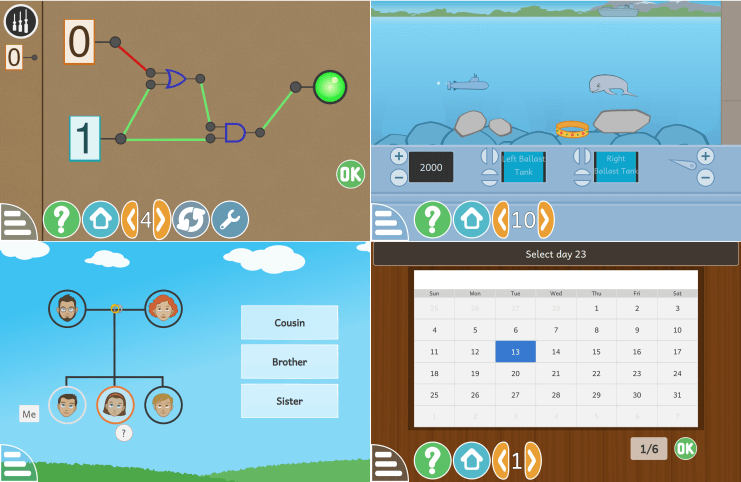
Install GCompris on Linux distributions using following commands.
$ wget http://gcompris.net/download/qt/linux/gcompris-qt-0.91-Linux64.sh $ chmod u+x gcompris-qt-0.91-Linux64.sh $ sudo ./gcompris-qt-0.91-Linux64.sh
3. Tux Paint
Tux Paint is a cross-platform award-winning drawing program targetted at children between the ages of 3 and 12 and it is used in schools to teach children how to paint using computer software.
It combines a simple UI with bold icons and texts, fun sound effects, an interactive nix mascot, etc.
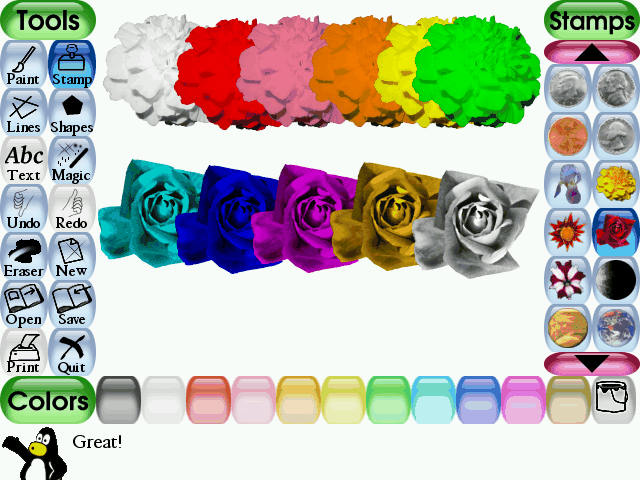
Install Tux Paint on Ubuntu based distributions using following commands.
$ sudo add-apt-repository ppa:secretlondon/ppa $ sudo apt-get update $ sudo apt-get install tuxpaint
4. ChildsPlay
ChildsPlay is a free app for Linux and Windows platforms featuring a collection of educational activities for children including the English alphabets, spelling, maths, Pacman, puzzles, etc.
ChildsPlay also aims to teach children eye-hand coordination by making them use the mouse and keyboard. It comprises tools that enable data logging, OpenOffice reports, activity development in Python/PyGame, etc and also features a plug-in system that enables you to manage different games to fit your preference.
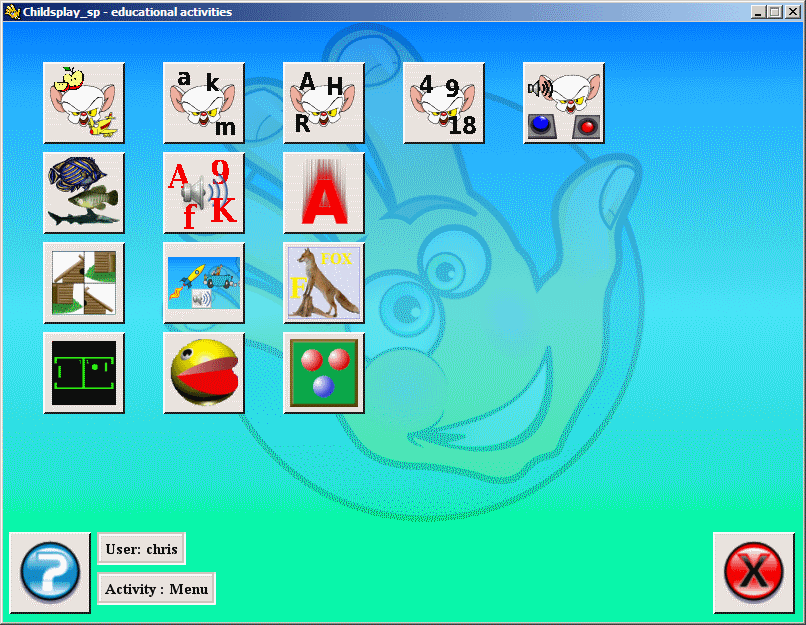
Install ChildsPlay on Ubuntu based distributions using following commands.
$ sudo apt-get update $ sudo apt-get install childsplay
5. KStars
The KStars app is part of the KDE Education project and it is an astronomy software with an accurate simulation of the night sky from any location in the world at any time. It includes 100 million+ stars, comets, asteroids, the sun and moon, etc.
This app is perfect for teachers, students, and amateur astronomers thanks to its list of advanced features including a FOV editor, an Attitude vs. Time tool, a Sky Calendar tool, and a “What’s up tonight” tool.
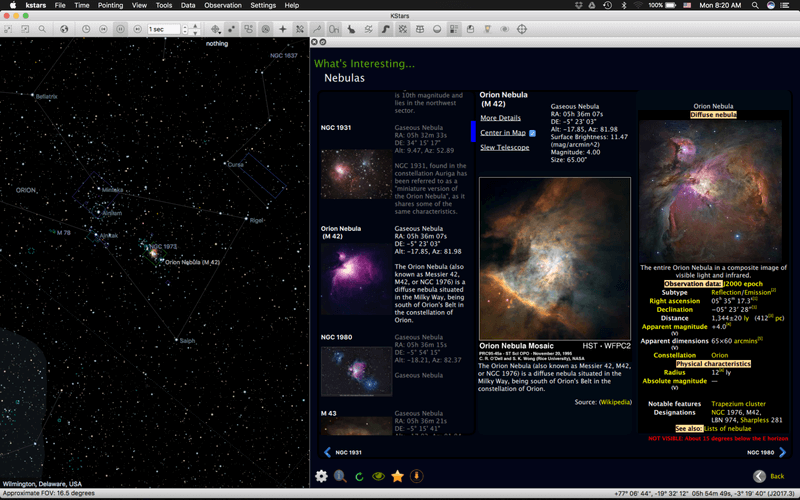
Install KStars on Ubuntu based distributions using following commands.
$ sudo apt-add-repository ppa:mutlaqja/ppa $ sudo apt-get update $ sudo apt-get install indi-full kstars-bleeding
6. KWordQuiz
KWordQuiz is an open-source general-purpose flashcard app for learning vocabulary and concepts in various other subjects like anatomy, music, history, etc. whose files you can download for free.
KWordQuiz uses the hvtml file format and because it is the KDE version of the windows program WordQuiz, all its files are compatible with the app.
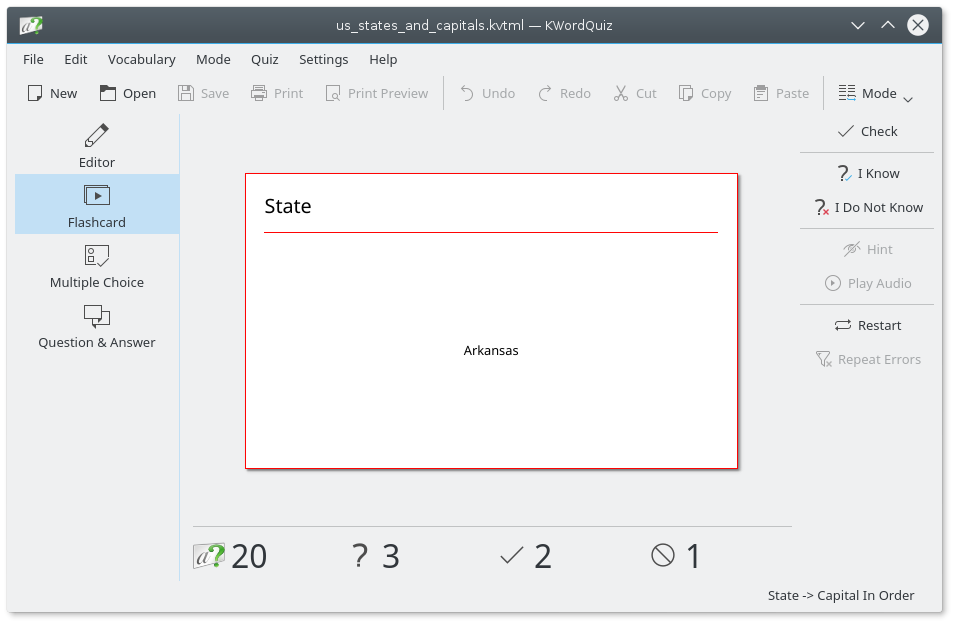
Install KWordQuiz on Ubuntu based distributions using following commands.
$ sudo apt-get update $ sudo apt-get install kwordquiz
7. Scratch
Scratch is a visual programming language and online community that aims to teach people (especially children) how to program using simple block-like interactions. Its projects are online but it get be set up on Linux distros to work offline.
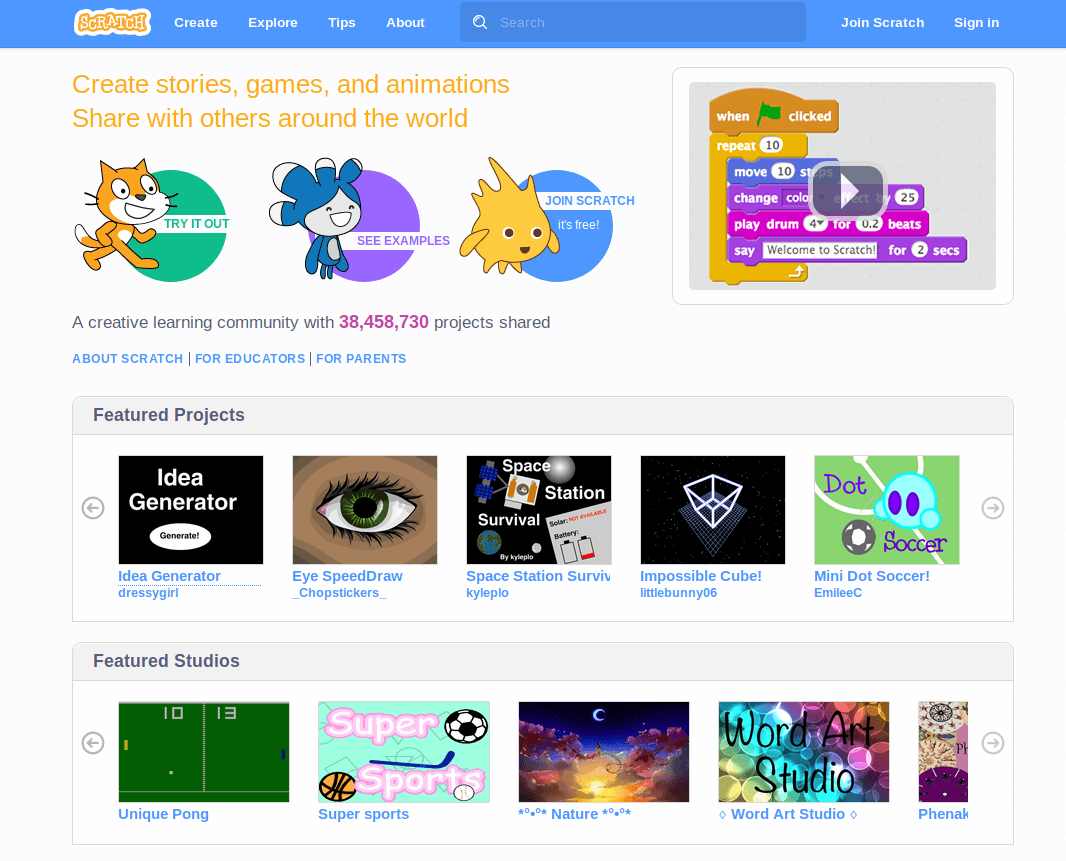
See how to install Scratch on Ubuntu and other distros here.
8. Celestia
Celestia is a free and cross-platform real-time 3D simulation app that lets you visualize space by exploring the universe in 3 dimensions. It allows you to travel beyond the galaxy with seamless movement with excellent zoom capabilities and visuals of comets, stars, planets, asteroids, etc.
What’s cooler is that Celestia supports add-ons that add more space objects to the app and it serves as an interactive planetarium.
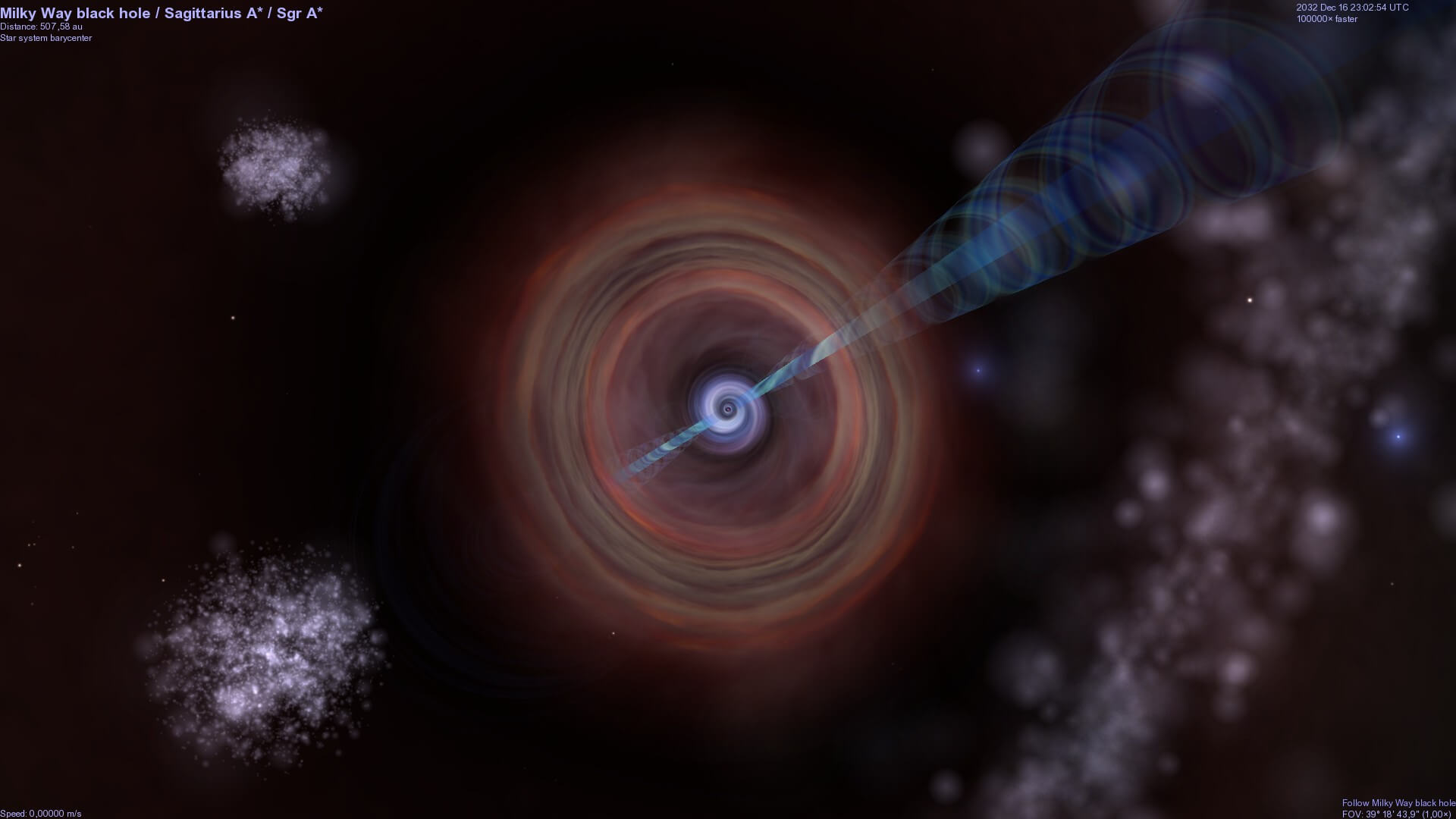
Install Celestia on Ubuntu based distributions using following commands.
$ sudo apt-get update $ sudo apt-get install celestia
9. TuxMath
TuxMath is an application that presents mathematics in the form of a game where you take on the role of the main character, Tux, who is to protect his planet from math problems which literally rain down.
The aim of the TuxMath is to improve the mental agility of anyone playing it and that’s why the problems rain down faster after each level you pass – definitely an excellent pick for kids learning maths.
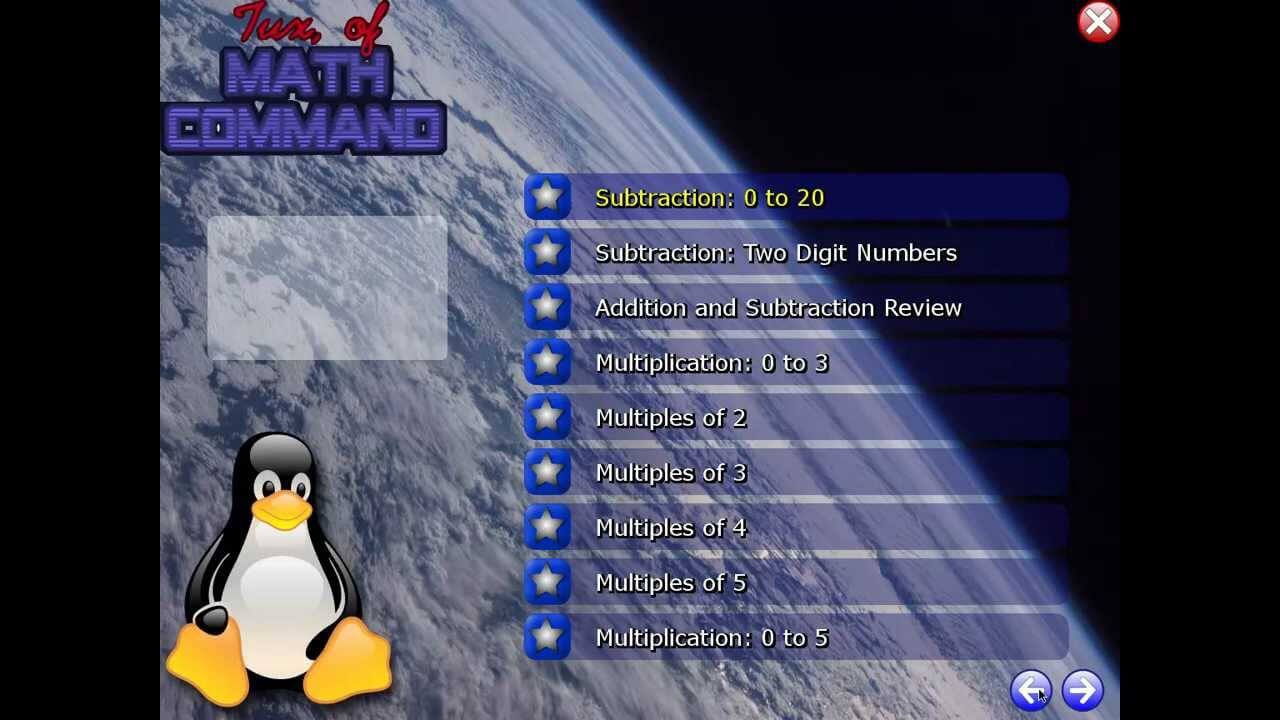
Install TuxMath on Ubuntu based distributions using following commands.
$ sudo apt-get update $ sudo apt-get install tuxmath
10. MAPLE
MAPLE is a proprietary math software that reportedly houses the most powerful math engine in the world and it features math problems that are straightforward to interpret, visualize, investigate and solve.
It can also be used to develop 3D simulations for math functions, to manipulate, visualize, and analyze data, and to solve matrix and calculus problems – features that researchers and engineers use for professional work. Both you and your kids can have a go at it.
There are other educational apps that are worthy of mention e.g. the awesome online math-oriented app suite GeoGebra, and KDE Edu Suite but my list ends here.
Do you know other applications to add to the list? The comments section is down below.

Childsplay looks like trash. The sourceforge page hasn’t been updated since 2013 and the version there and the version in the Ubuntu repositories both say “demo” at the top and only show a very small selection of games – nothing like the screenshots here and on sourceforge. The games are buggy and half-assed, e.g. a game where the child scores points by clicking on fish, or a version of pong with no spin and where the ball gets caught in the bat. Failing to implement Pong properly is astonishing.
I miss Keduca
I’d like to try Celestia; based on your recommendation, it looks very good, Unfortunately, here is what is reported when using ‘apt-get install celestia” in the terminal:
“Package celestia is not available, but is referred to by another package.
This may mean that the package is missing, has been obsoleted, or
is only available from another source
E: Package ‘celestia’ has no installation candidate”
Can you ‘ping’ the creators for an answer, Martins?
“MAPLE is an open-source math software”
No, MAPLE is a commercial program. It is not open-source.
“KStars” is an outstanding program which anyone even mildly interested in astronomy should check out. Even better for getting your children interested, and weaning them off of DumbPhones.
Every time you log in, you’re presented with a “Tip of the Day” (if you say you want that option); here’s mine for today:
“If you want the very latest orbital information for asteroids and comets (including recently-discovered objects), check the “Download Data” tool (“File->Download New Data” or Ctrl+D) frequently for updated ephemerides.”
Thanks, Martins.
My pleasure, Henry.
In my experience, KDE apps are usually worth writing home about.
I might have used “Maple”.
The hoops you have to jump through to even figure out how to figure out their website is a deal-breaker for me. Software manufacturers need to understand that their website and product description is NOT a ‘cutesy’ application; it is a sales tool, a SALES BROCHURE with a PROMINENT price list, pure and simple. My time is valuable–start OUT by giving me THE PRICE LIST!. I don’t mind the ‘marketbabble’; just do it LAST.
The Sales, Engineering, and Design Departments have very important functions to play in the generation of a product’s web-site. The Marketing Department’s should be vanishingly small–as we say in mathematics..
‘Maple’ may have–and looks like “would have”–been a great fit for my needs (I seem to remember good references to it elsewhere). They’ll never know.
“For [goodness’] sake, if you have something important to tell me, start at the end.”–
Edna St. Vincent Millay.
Yeah? What did you have issues with? using it came easily to me.
https://www.youtube.com/watch?v=md7tFuFl86U
Thanks for the recommendation, Emil.